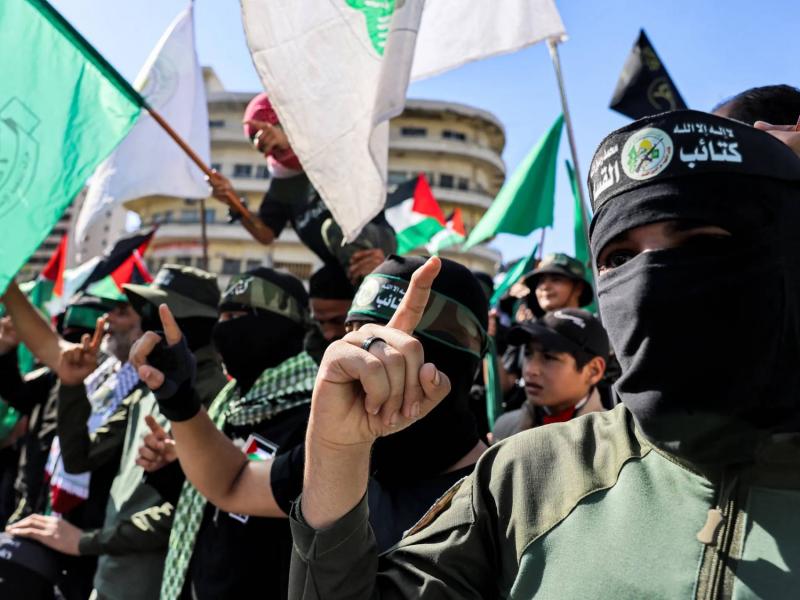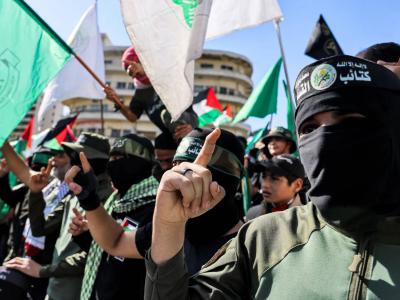Some close to the leadership of "Hamas" outside Gaza convey that the planning for the "Al-Aqsa Flood" operation was based on a set of pillars, the most important of which is what was termed “Unity of Fronts,” meaning that the Iranian-backed resistance militias would open fire on the Israeli army from each of their fronts to distract, confuse, and inflict unbearable losses. However, this plan's equilibrium was disrupted days after the attack began due to the failure of battles to ignite on the fronts as had been agreed behind the scenes with the authorities in Tehran, which contributed to the Israeli army focusing solely on "Hamas" fighters, allowing it to wreak havoc on the people of Gaza through killing, destruction, and displacement.
The retreat of Hezbollah’s Secretary-General Hassan Nasrallah's rhetoric from threatening to strike "Haifa and beyond Haifa" and destroy Israel in preparation for prayer in Jerusalem to military operations and instructions to refrain from using mobile phones to prevent Israeli eavesdropping was notable. Additionally, the operations of the Houthis against commercial ships in Bab al-Mandab as a means of pressuring Israel and the world remained limited and ceased after a terrifying American-British bombardment of Houthi centers. The operations of the Popular Mobilization Forces in Iraq were confined to three missiles that did not reach Israel and fell in Iraqi territory near al-Ramtha.
It is no longer a secret what the commander of the Quds Force, Ismail Qaani, conveyed to Hassan Nasrallah: that Iran does not seek to expand the war and that Supreme Leader Ali Khamenei's desire is to protect Hezbollah's position in Lebanon without getting involved in a war with Israel "that would devastate everything." Subsequently, the party's media justified the failure to respond to Israel's ongoing attacks with phrases of strategic patience and responding at the right time and place.
In the Iranian military operation in response to the bombing of the Iranian consulate in Damascus, Iran wanted to maintain some dignity domestically and among its supporters without igniting a full-scale war and did not mind if Benjamin Netanyahu benefited from such an operation by changing the global climate against him and his country due to the horrific crimes in Gaza, repositioning himself as a victim. In reality, after the Iranian attack, Israel found itself in a position where it could invade Rafah and carry out killing and displacement operations without anyone to object or prevent it, especially after the world witnessed dozens of Iranian missiles lighting up the sky heading towards Israel on television screens.
The world, mesmerized by the broadcasts, overlooked that Iran informed hours before its operation that the drones and missiles were not fitted with explosive detonators; thus, they were merely a low-quality Hollywood display in terms of production and realistic effects. It became evident that Iran does not want a war with Israel and that the Palestinian cause and the liberation of Jerusalem are cards it uses to enhance its role in the region. This is evidenced by the abandonment of the Unity of Fronts after the "Al-Aqsa Flood" and the staged drone attack.
Secondly, to enhance its role in the region, Iran will sacrifice peoples, cities, cultures, and economies, executing its projects through the arms it has established, even if this leads to destruction, hunger, and hardship. One needs only to look at the situation of the countries Iran has controlled from Lebanon to Syria, Iraq, Yemen, and Palestine to prove this.
Thirdly, the most important issue for the Iranian regime is maintaining its gains in Lebanon, Syria, and Iraq, which it has aspired to since the establishment of the Safavid state, not for the sake of preserving nations and their peoples but for protecting Iran's dream gains.
A Western expert in international affairs states that the Iranian regime will resist Israel through Arabs, yet it faces obstacles in its aspirations, the most significant of which is exhausting the energies of the peoples, including the Iranian people, while offering only slogans, promises, and a noticeable decline in living standards. The day of the leader's departure will likely be a day of change and a reassessment by the peoples of their conditions and an evaluation of what has occurred, as has been the case in all theocratic single-party systems without exception.
For about a week, the Middle East and much of the world were on the brink, awaiting the promised Israeli retaliation for the attacks on April 13 carried out by Iran. When the response came early last Friday evening, in the form of drone strikes near the Iranian cities of Isfahan and Tabriz, there was collective relief and a sigh in Washington and the capitals of Europe and the Middle East as well.
The Israelis struck a military airbase near the city of Isfahan in central Iran, and Iranian officials reported that another group of drones was shot down in the Tabriz area, about 500 miles north of Isfahan. However, Iran did not report any Israeli warplanes in its airspace or heavy explosions, only mentioning minimal damage. Perhaps equally important, there were no inciting statements from either side. For now at least, it appears that the feared escalation and wider war have been avoided.
On the other hand, the Israeli strikes were more than what the White House had wanted. President Joe Biden urged Israeli Prime Minister Benjamin Netanyahu, in a phrase repeated by many observers over the week, to "take the win," referring to the almost perfect defense against the Iranian strikes and the fact that the Iranian attack may have provided Israel with support in global public opinion and portrayed it as a victim of an unprecedented Iranian onslaught.
However, if Israel somewhat ignored the White House, on the other hand, Friday's response indicated that it reacted to calls for a limited strike. The drone strikes were a milder counterpunch than many had feared, suggesting that Netanyahu and his war cabinet understood the risks and listened to messages from Washington and elsewhere.
However, the absence of an official government comment also means that it was unclear whether the drone strikes constituted Israel's complete response to the Iranian strikes. In other words, retaliation may not yet be over. The "New York Times" reported last Monday that Israeli leaders discussed bombing many military targets throughout Iran, including near Tehran, but chose a more limited strike that avoided significant damage, thus reducing the likelihood of escalation, at least for now.
Ultimately, what follows will likely be a return to the long-standing "shadow war" between Israel and Iran, fought intermittently for decades. Israel has repeatedly targeted Iranian Revolutionary Guard-linked sites, personalities, and nuclear programs and has never publicly acknowledged such strikes. Friday's attack may have been yet another event in this "shadow war," with more to come abroad.
The big question here is: Will the Iranians respond in a significant manner? And going forward, what are the chances of a ceasefire? Because this war has now evolved beyond just an Israel vs. Hamas issue. A retired Western general responds, stating: "The coming days may witness problems on three fronts: the first is from Iran's proxies, especially Hezbollah, with a hundred thousand missiles available. Let’s keep an eye on that; the number may rise. Secondly, we need to monitor what happens in the Red Sea and the Houthis; will they resume their movements after what happened to them? Finally, let’s open the internet and look for potential shadow escalation in the form of cyberattacks."
In any case, a large-scale fire may have been avoided. But the "shadow wars" remain.




